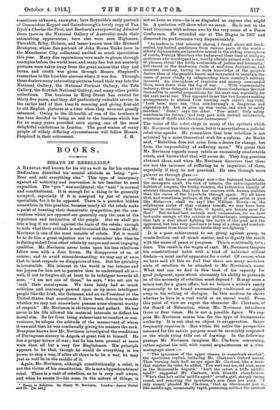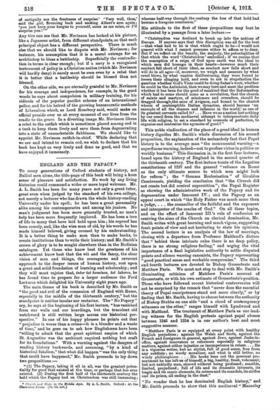BOOKS.
ESSAYS IN REBELLION.*
A RADICAL well known for his wit as well as for his extreme Radicalism described his mental attitude as being "pro- Boer and anti everything else." This type of insurgency against all authority and convention is too familiar to need exposition. The " pro " was accidental; the "anti" is normal and constitutional. It is enough for a thing to be generally accepted, especially if it is acoepted by fiat of eminent specialists, for it to be opposed. There is a paradox hidden somewhere in this practice, because nearly all the rebels make a point of boasting their democratic sympathies, yet the con- ventions which are opposed are generally only the sum of the experience and inclination of the people. But we shall get into a bog if we rebel against the logic of the rebels; enough to note what their attitude is and to remind the reader that Mr. Nevinson is one of the most notable of rebels. Yet it would be to do him a great injustice not to remember also that he is distinguished from other rebels by unique and most engaging qualities. Mr. Nevinson never looks upon his less rebellious fellow men with a dour frown. He disapproves of us, of course ; and to avoid misunderstanding we may say at once that in most respects we disapprove of him. But his geniality is irresistible. His interest in the world is too intense and too joyous for him not to perceive that to understand all is— well, if not to forgive all, at least to be indulgent towards all men. "I am not one of those," he says, " who set out to 'crab' their countrymen. We have lately had so much criticism and contempt poured upon us by more intelligent people like the Irish, the Germans, and an ex-President of the United States that sometimes I have been driven to wonder whether we may not somewhere possess some element worthy of respect." Mr. Nevinson is chivalrous and gallant. He has never in his life allowed his material interests to deflect his moral aim. So far from being subservient to comfort or con- venience, he adopts the attitude of the manservant of whom it was said that he was continually giving his masters the sack. Everyone knows bow Mr. Nevinson investigated the conditions of Portuguese slavery in Angola at great risk to himself. He has a proper horror of war ; but he has been present at more wars than all but a very few Englishmen. His principle appears to be that, though he would do everything in his power to stop a war, if after all there is to be a war, he may just as well be in the middle of it.
Again, Mr. Nevinson, although constitutionally a rebel, is not the victim of his constitution. He is not a hypochondriacal rebel. There is a cant of rebellion, as he is very well aware, and when he scents it—his nose, in the nature of things, is
• Essays in Rebellion. By Henry W. Nevinson. London: James Nisbet and Co. [6s. net.]
not so keen as ours—he is as disgusted as anyone else might be. A quotation will show what we mean. He is not in the least overcome with solemn awe by the very name of a Peace Conference. He attended one at The Hague in 1907 and dissected its performance very dispassionately.
"As leaders in that celestial chorus, I found about 400 frock- coated, top-hatted gentlemen from various parts of the world— elderly diplomatists, ambassadors inured to the stifling atmosphere of courts, Foreign Ministers who had served their time of intrigue, professors who worshipped law, worthy officials primed with a stock of phrases about the noble sentiments of justice and humanity,' but reared in the deadening circle of uniforms, decorations, and insincere courtesy, having no more knowledge of the people's desires than of the people's bacon, and instructed to maintain the cause of peace chiefly by safeguarding their country's military interests. An atmosphere of suspicion and secrecy surrounded them, more dense than the fog of war. . . . With commendable industry, those delegates at this Second Peace Conference devoted themselves to careful preparations for the next war, especially for the next naval war. They appeared to me like two farmers making arrangements to abstain from burning each other's hay-ricks.
Look here,' says one, this rick-burning's a dangerous and expensive job. Lot us give up wax vestas, and stick to safety matches.' Done !' says the other. 'Now mind! Only safety matches in the future !' and they part with mutual satisfaction, conscious of thrift and Christian forbearance."
The voice of the rebel rings in many of the epithets which Mr. Nevinson has there chosen, but it is nevertheless a judicial rebel who speaks. He remembers that true rebellion is not actuated by a mere theoretical wish for a reform. As Burke said, " Rebellion does not arise from a desire for change, but from the impossibility of suffering more." We guess that Mr. Nevinson regards many rebels as excessively comfortable rebels, and knows that that will never do. They hug precious abstract ideas, and when Mr. Nevinson discovers that these are not the outcome of suffering he is impatient of them, especially if they be not practicaL He sees through mere palaver as through glass :-
" We all know those meetings now—the fraternal handshake, the menagerie smell, the reek of tobacco, the indistinguishable hubbub of tongues, the frothy violence, the bottomless inanity of abstract dissensions, that have less concern with human realities than the curve of the hyperbola through space. We all know that, and sometimes, perhaps, at the sight of some artist or poet like Heine—or, shall we say ? like William Morris—in the sulphurous crater of that volcanic tumult, we may have been tempted to exclaim, 'Not here, 0 Apollo, are haunts meet for thee!' But we had best restrain such exclamation, for we have had quite enough of the artistic or philanthropic temperaments that talk a deal about fighting the battle of the poor and the oppressed, but take very good care to keep at a clean and comfort- able distance from those whose battle they are fighting."
It is a poor achievement to set group against group, to create faction out of numb matter, and to dignify the result with the name of peace or progress. This is continually bele.; done. The result is the wages of cant. Mr. Nevinson tempers his constitutional habit with a kind of universal critical disdain—a most useful apparatus for a rebel. Of course, when we have said all this we feel that there are many mistaken sorts of rebellion to be attached to Mr. Nevinson's name. What test can we find in this book of his capacity for good judgment, upon which ultimately his ability to persuade us of the necessity of rebellion must depend ? It may seem a minor test for a grave affair, but we believe a writer's sanity is generally to be found unconsciously vindicated or signed away in his writing of dialogue. In this medium he shows whether he lives in a real world or an unreal world. From this point of view we regret the character Mr. Clarkson, of the Board of Education, whom Mr. Nevinson introduces three or four times. He is not a possible figure. We sup- pose Mr. Nevinson means him for the type of bureaucratic authority. It is not that we object to exaggeration. Satire frequently requires it. But within the satire the perspective assumed for the satiric purpose must be invariably respected or the whole thing falls out of drawing. In the following passage Mr. Nevinson imagines Mr. Clarkson conversing, rather against his will, with casual acquaintances at a cine-
matograph show :-
"'The ignorance of the upper classes is sornothink shockin", the sportsman replied, imitating Mr. Clarkson's Oxford accent. Then turning back half an eye upon Mr. Clarkson, like a horse that watcher its rider, he added, 'You wait and see, old cock, same as the Honourable Asquith.' Isn't the retort a trifle middle- aged ?' suggested Mr. Clarkson, with friendly cheerfulness. Who's that he's callin' middle-aged P cried a girl, sharply facing round, and removing the sportsman's arm from her waist. ' I only meant,' pleaded Mr. Clarkson, that an obsolescent jest is, like middle-age, occasionally vapid, possessing neither the interest of antiquity nor the freshness of surprise.' Very well, then,' said the girl, flouncing back and seeking Albert's arm again; 'you just keep your tongue to yourself, same as me mine, or 1-1/ surprise you
Any tiro can see that Mr. Nevinson has looked at his picture, like a Japanese artist, from different standpoints, so that each principal object has a different perspective. There is much else that we should like to dispute with Mr. Nevinson ; for instance, his assumption that it is a moral outrage for an archbishop to bless a battleship. Superficially the contradic- tion in terms is clear enough ; but if a navy is a recognized instrument of policy in a Christian nation (which Mr. Nevinson will hardly deny) it surely must be seen even by a rebel that it is better that a battleship should be blessed than not blessed.
On the other aide, we are eternally grateful to Mr. Nevinson for his courage and independence, for example, in the good words he says about compulsion in military training, for his ridicule of the popular pacifist scheme of an international police, and for his hatred of the growing bureaucratic methods of Liberalism which, as Lord Rosebery said, would make an official preside over us at every moment of our lives from the cradle to the grave. In a diverting image Mr. Nevinson likens a rebel to the catfish which is sometimes placed among cod in a tank to keep them lively and save them from degenerating into a state of unmarketable flabbiness. We should like to appoint Mr. Nevinson catfish-in-chief. While declaring that we are and intend to remain cod, we wish to declare that his book has kept us very lively and done us good, and that we have enjoyed it immensely.



































































 Previous page
Previous page